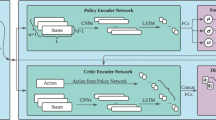Abstract
Financial portfolio management involves the constant redistribution of wealth over a set of financial assets and can, by its sequential nature, be modelled using reinforcement learning (RL). Federated learning allows traders to jointly train models without revealing their private data. We show on S&P500 market data how personalized, robust federated reinforcement learning using Fed+ produces trading policies that offer higher annual returns and Sharpe ratios than other methods.
Access this chapter
Tax calculation will be finalised at checkout
Purchases are for personal use only
Similar content being viewed by others
Notes
- 1.
We use the following 50 assets from the S&P500 technology sector: AAPL, ADBE, ADI, ADP, ADS, AKAM, AMD, APH, ATVI, AVGO, CHTR, CMCSA, CRM, CSCO, CTL, CTSH, CTXS, DIS, DISH, DXC, FB, FFIV, FISV, GLW, GOOG, IBM, INTC, INTU, IPG, IT, JNPR, KLAC, LRCX, MA, MCHP, MSFT, MSI, NFLX, NTAP, OMC, PAYX, QCOM, SNPS, STX, T, TEL, VZ, WDC, WU, and XRX.
References
Almahdi S, Yang SY (2017) An adaptive portfolio trading system: a risk-return portfolio optimization using recurrent reinforcement learning with expected maximum drawdown. Expert Syst Appl 87:267–279
Begleiter R, El-Yaniv R, Yona G (2004) On prediction using variable order Markov models. J Artif Intell Res 22:385–421
Berndt DJ, Clifford J (1994) Using dynamic time warping to find patterns in time series. In: KDD workshop, Seattle, vol 10, pp 359–370
Black F, Scholes M (1973) The pricing of options and corporate liabilities. J Polit Econ 81(3):637–654
Buehler H, Gonon L, Teichmann J, Wood B (2019) Deep hedging. Quant Financ 19(8):1271–1291
Goodfellow I, Pouget-Abadie J, Mirza M, Xu B, Warde-Farley D, Ozair S, Courville A, Bengio Y (2014) Generative adversarial nets. In: Advances in neural information processing systems, pp 2672–2680
Haugen RA, Haugen RA (2001) Modern investment theory, vol 5. Prentice Hall, Upper Saddle River
Jiang Z, Xu D, Liang J (2017) A deep reinforcement learning framework for the financial portfolio management problem. arXiv preprint arXiv:170610059
Kariya T, Liu RY (2003) Options, futures and other derivatives. In: Asset pricing. Springer, Boston, MA, pp 9–26
Krizhevsky A, Sutskever I, Hinton GE (2012) Imagenet classification with deep convolutional neural networks. In: Advances in neural information processing systems, pp 1097–1105
Li T, Sahu AK, Zaheer M, Sanjabi M, Talwalkar A, Smith V (2020) Federated optimization in heterogeneous networks. Proc Mach Learn Syst 2:429–450
Markowitz H (1959) Portfolio selection: efficient diversification of investments, vol 16. Wiley, New York
McMahan B, Moore E, Ramage D, Hampson S, y Arcas BA (2017) Communication-efficient learning of deep networks from decentralized data. In: Artificial intelligence and statistics. PMLR, pp 1273–1282
Pillutla K, Kakade SM, Harchaoui Z (2019) Robust aggregation for federated learning. arXiv preprint arXiv:191213445
Sharpe WF (1966) Mutual fund performance. J Bus 39(1):119–138
Silver D, Lever G, Heess N, Degris T, Wierstra D, Riedmiller M (2014) Deterministic policy gradient algorithms. In: Proceedings of the 31st international conference on international conference on machine learning – JMLR.org, ICML’14, vol 32, pp I–387–I–395
Sutton RS, McAllester DA, Singh SP, Mansour Y (2000) Policy gradient methods for reinforcement learning with function approximation. In: Advances in neural information processing systems, pp 1057–1063
Ye Y, Pei H, Wang B, Chen PY, Zhu Y, Xiao J, Li B (2020) Reinforcement-learning based portfolio management with augmented asset movement prediction states. In: Proceedings of the AAAI conference on artificial intelligence, vol 34, pp 1112–1119
Yin D, Chen Y, Kannan R, Bartlett P (2018) Byzantine-robust distributed learning: towards optimal statistical rates. PMLR, Stockholmsmässan, Stockholm, vol 80. Proceedings of Machine Learning Research, pp 5650–5659. http://proceedings.mlr.press/v80/yin18a.html
Author information
Authors and Affiliations
Corresponding author
Editor information
Editors and Affiliations
Rights and permissions
Copyright information
© 2022 The Author(s), under exclusive license to Springer Nature Switzerland AG
About this chapter
Cite this chapter
Yu, P., Wynter, L., Lim, S.H. (2022). Federated Reinforcement Learning for Portfolio Management. In: Ludwig, H., Baracaldo, N. (eds) Federated Learning. Springer, Cham. https://doi.org/10.1007/978-3-030-96896-0_21
Download citation
DOI: https://doi.org/10.1007/978-3-030-96896-0_21
Published:
Publisher Name: Springer, Cham
Print ISBN: 978-3-030-96895-3
Online ISBN: 978-3-030-96896-0
eBook Packages: Computer ScienceComputer Science (R0)




